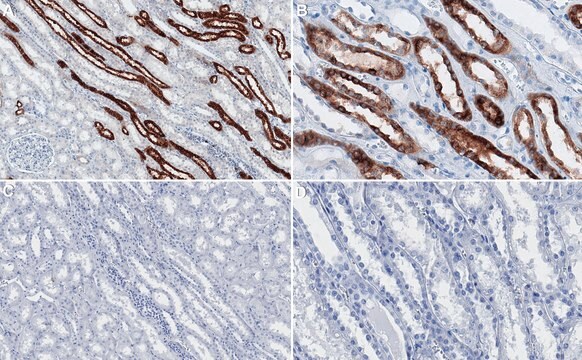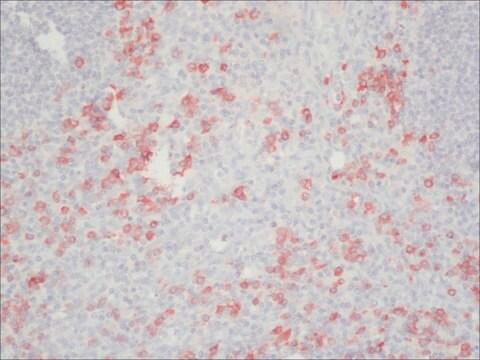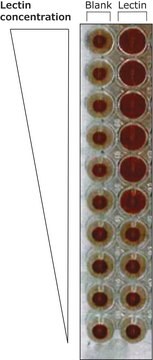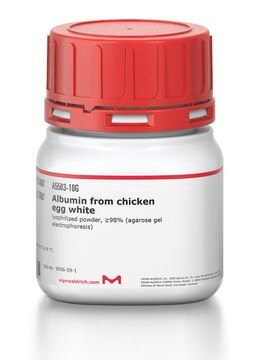추천 제품
생물학적 소스
human
Quality Level
분석
>95%
양식
solid
제조업체/상표
Chemicon®
기술
activity assay: suitable
NCBI 수납 번호
UniProt 수납 번호
배송 상태
wet ice
유전자 정보
human ... UMOD(7369)
관련 카테고리
일반 설명
Research area: Immuno and CKS
Tamm-Horsfall glycoprotein (THGP) also known as uromodulin is abundantly present in mammalian urine. It is highly expressed in the thick ascending limb of the Henle′s loop in the kidney. This protein consists of three epidermal growth factor (EGF) domains and a zona pellucida-like domain. THGP is a member of the glycosylphosphatidylinositol (GPI) protein family and is attached to the cell membrane by a C-terminal GPI- anchor. The THGP gene is located on the human chromosome at 16p12.3.
Tamm-Horsfall glycoprotein (THGP) also known as uromodulin is abundantly present in mammalian urine. It is highly expressed in the thick ascending limb of the Henle′s loop in the kidney. This protein consists of three epidermal growth factor (EGF) domains and a zona pellucida-like domain. THGP is a member of the glycosylphosphatidylinositol (GPI) protein family and is attached to the cell membrane by a C-terminal GPI- anchor. The THGP gene is located on the human chromosome at 16p12.3.
애플리케이션
Tamm-Horsfall Glycoprotein has been used in luciferase activity assay of immortalized proximal tubular cells and human primary proximal tubular epithelial cells. It has also been used as a standard for calibration of uromodulin in urine samples.
생화학적/생리학적 작용
Tamm-Horsfall glycoprotein (THGP) may play a role in antibacterial host defense, inflammatory kidney disease, and the urogenital tract. It exhibits protective effects against kidney stone formation by reducing the calcium oxalate precipitation. Mutations in the THGP gene lead to familial juvenile hyperuricemic nephropathy (FJHN), glomerulocystic kidney disease (GCKD), and medullary cystic kidney disease type 2 (MCKD-2).Tamm-Horsfall Protein (THP) mediates the formation of mucous coat of the bladder, thereby regulating the permeability of the ascending loop of Henle. THP is known to adhere to Escherichia coli strains with type 131 and type S32 fimbriae, thereby blocking their interaction with the uroepithelium. Additionally, THP activates cells by directly signaling through Toll-like receptor 4 (TLR4). It has been demonstrated that THP stimulates the production of tumor necrosis factor-alpha (TNF-α) and tissue factor in monocytes through TLR4.
물리적 형태
Lyophillized from deionized water containing 0.02% sodium azide.
저장 및 안정성
Store +2-8°C for up to 3 months after date of receipt.
DO NOT FREEZE.
DO NOT FREEZE.
법적 정보
CHEMICON is a registered trademark of Merck KGaA, Darmstadt, Germany
면책조항
Unless otherwise stated in our catalog or other company documentation accompanying the product(s), our products are intended for research use only and are not to be used for any other purpose, which includes but is not limited to, unauthorized commercial uses, in vitro diagnostic uses, ex vivo or in vivo therapeutic uses or any type of consumption or application to humans or animals.
Storage Class Code
11 - Combustible Solids
WGK
WGK 1
Flash Point (°F)
Not applicable
Flash Point (°C)
Not applicable
시험 성적서(COA)
제품의 로트/배치 번호를 입력하여 시험 성적서(COA)을 검색하십시오. 로트 및 배치 번호는 제품 라벨에 있는 ‘로트’ 또는 ‘배치’라는 용어 뒤에서 찾을 수 있습니다.
Julie A D Van et al.
Molecular & cellular proteomics : MCP, 19(3), 501-517 (2019-12-28)
Chronic hyperglycemia is known to disrupt the proteolytic milieu, initiating compensatory and maladaptive pathways in the diabetic kidney. Such changes in intrarenal proteolysis are captured by the urinary peptidome. To elucidate the early kidney response to chronic hyperglycemia, we conducted
Aparna Renigunta et al.
The Journal of biological chemistry, 286(3), 2224-2235 (2010-11-18)
Tamm-Horsfall glycoprotein (THGP) or Uromodulin is a membrane protein exclusively expressed along the thick ascending limb (TAL) and early distal convoluted tubule (DCT) of the nephron. Mutations in the THGP encoding gene result in Familial Juvenile Hyperuricemic Nephropathy (FJHN), Medullary
Noel Edwards et al.
Nephrology, dialysis, transplantation : official publication of the European Dialysis and Transplant Association - European Renal Association, 32(12), 1994-1999 (2017-06-13)
Heterozygous mutations in UMOD encoding the urinary protein uromodulin are the most common genetic cause of autosomal dominant tubulointerstitial kidney disease (ADTKD). We describe the exceptional case of a patient from a consanguineous family carrying a novel homozygous UMOD mutation
자사의 과학자팀은 생명 과학, 재료 과학, 화학 합성, 크로마토그래피, 분석 및 기타 많은 영역을 포함한 모든 과학 분야에 경험이 있습니다..
고객지원팀으로 연락바랍니다.








